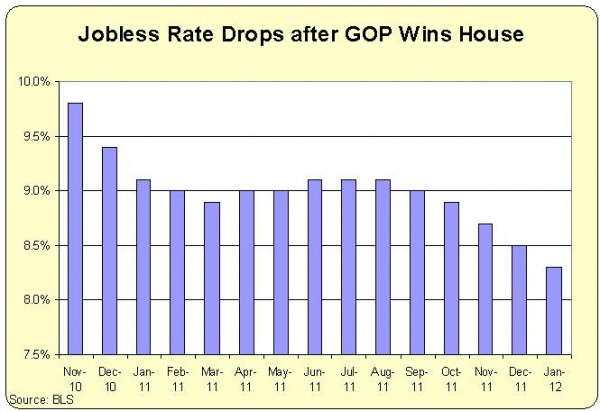The new unemployment numbers show a joblessness rate of 8.3 percent.
From a political perspective, this is good news for the White House. Even though the Obama Administration projected that the unemployment rate today would be about 2-percentage points lower if the so-called stimulus was adopted, most people aren’t looking at the numbers analytically.
Instead, what matters most is the trend. And since there’s been steady movement in the right direction, the President can say it’s somehow because of his policies.
Whether that’s true or not doesn’t matter. Politics is about perception. And since I began predicting, back in 2010, that Obama would win reelection if the joblessness rate was 8 percent or below, the folks at the White House should be smiling.
But there’s another group of people who should be happy. Republicans can argue that the improvement began almost precisely at the moment they took control of the House of Representatives.
Here are the monthly numbers, beginning in November 2010.
But I’m not here to spin a happy story for either Obama or House Republicans. The real story is that gridlock works, just as our Founding Fathers envisioned.
Once Republicans took control of the House, it meant that there was almost no chance that Obama would be able to impose more of his agenda.
This means no possibility of cap-and-trade industrial policy. It means no big new spending initiatives. It means no threat of a value-added tax.
And this means that the private sector finally has some degree of comfort that things won’t get worse in the future. This is not a trivial matter. Indeed, the Great Depression lasted so long and was so deep in part because Hoover and Roosevelt kept expanding the burden of taxes, spending, regulation, and intervention. The productive sector of the economy kept getting knocked to the canvas, so there’s was never an opportunity to adjust to the new burdens.
This isn’t to say gridlock, by itself, solves problems. Necessary reforms such as the Ryan budget can’t be implemented if we have gridlock forever, and that means America eventually would become another Greece.
But if the choice is between moving in the wrong direction and treading water, then the latter is better. It means the economy can adjust and slowly recover.
Yes, the potential long-run growth rate won’t be as high because of the bad policies implemented in Obama’s first two years, but gridlock means that nothing really bad will happen in the near future. As such, we can at least expect continued improvement in the jobs market and decent – albeit not impressive – growth.
Ironically, that’s good news for Obama. If he wins reelection, he should send a bouquet of roses to John Boehner.

